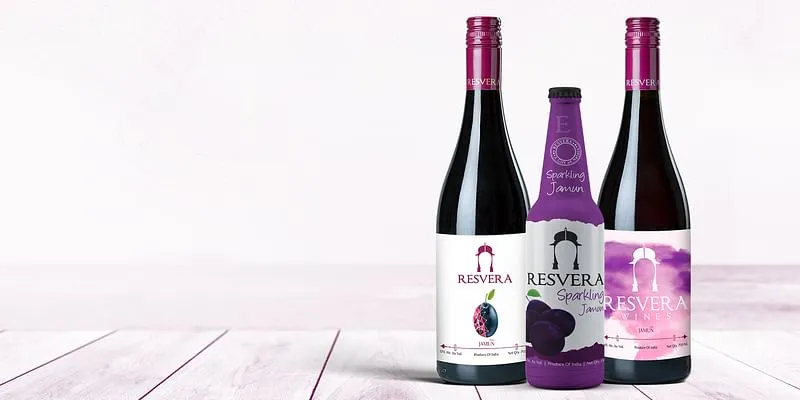How this jamun wine brand hit the right note in its first year, clocking Rs 4.5 Cr in revenue
Based in Nashik, Mumbai, Komal Somani invested five years and Rs 50 lakh into research and development of jamun wines. Her venture Resvera Wines now clocks an annual revenue of Rs 4.5 crore.
A trip to popular hill station Mahabaleshwar seven years ago left Komal Somani high on life and entrepreneurial ideas. An engineer by qualification, she was leading HR for an IT company before venturing into the wine industry with her enterprise .
“During the trip, one of our friends served us a cocktail made from Jamun. This sparked a discussion around the fruit and its benefits,” she tells HerStory.
Although a healthy fruit that is abundantly grown in India, Komal learnt that Jamun is a highly delicate fruit that is cultivated for only 15 days in a year. She says although it does grow abundantly, 90 percent of it gets decomposed in the forest areas and does not get consumed.
To preserve the benefits of Jamun in the form of wine, Komal founded Resvera in 2015. The name, she explains, is derived from the Resvaratrol, an anti-ageing agent that is richly found in Jamun.
After dedicating five years to research, her D2C wine brand that was launched during the pandemic is now tapping India’s wine market, valued at $150 million and expected to grow at a CAGR of 20 to 25 percent.
The making of Jamun wine

With no first-hand knowledge of wine making, Komal took her time to get her research right. It was also quite a task to find wine makers willing to work with Jamun.
“Most winemakers are used to working with grapes and the process of experimenting with wine takes time as it needs to age. Additionally, Jamun is a seasonal fruit,” she adds.
After several failed attempts, one of Komal's colleagues suggested reaching out to an award-winning Canadian winemaker known for crafting great fruit wines who accepted it as a challenge to make wine out of Jamun, flew to India several times to have the product ready, and trained the Resvera team as well.
However, wine storage also proved to be a challenge, but Komal tackled this by hiring professionals in the field. She says all the effort into research and development is worth the time and money, as the goal was to offer a quality product. “Today, everything is about experience, so we wanted to ensure the wine also tastes good, and is not just worthy for its health benefits,” she adds.
Having rented a vineyard, Resvera sources organic Jamun from tribal people - mostly women - through self-help groups.
The COVID-19 impact
By May 2020, Resvera wine was ready to enter the market despite the pandemic raging in its initial stages and the country undergoing strict lockdowns. As CMO and founder, Komal realised the opportunity, and decided to highlight the fruit’s benefits when attention to health and immunity was at its highest.
“It was the right market timing; we took a purely digital route through our social media channels and the response was amazing.” This, despite most people avoiding beverages, as one of the common pieces of advice to fight COVID-19 was to consume warm drinks like tea and boiled water.
In the last one year, Resvera has sold over 12,000 cases of wine, and clocked an annual revenue of Rs 4.5 crore, according to Komal. Based in Nasik, she is reaping the profits after investing about Rs 50 lakh, which she borrowed from her husband who is also an entrepreneur.
Now working with a core team of around 60 people, Komal says team building has not been a big challenge as she has her experience in HR to bank on. But, she says, what really made a difference is that her people also believed in the product.
Moving ahead, she wants to take Resvera outside India, and is looking at around 160 countries. “The plan is in place,” she quips, without giving out many details.
YourStory’s flagship startup-tech and leadership conference will return virtually for its 13th edition on October 25-30, 2021. Sign up for updates on TechSparks or to express your interest in partnerships and speaker opportunities here.
For more on TechSparks 2021, click here.
Edited by Anju Narayanan









![[Exclusive] Delhi-based dairy startup Doodhvale Farms raises $3M from Atomic Capital](https://images.yourstory.com/cs/2/47ea3f60084e11efbdcb2f46d4aa7266/NameImage8-1732017294421.jpg?mode=crop&crop=faces&ar=1%3A1&format=auto&w=1920&q=75)